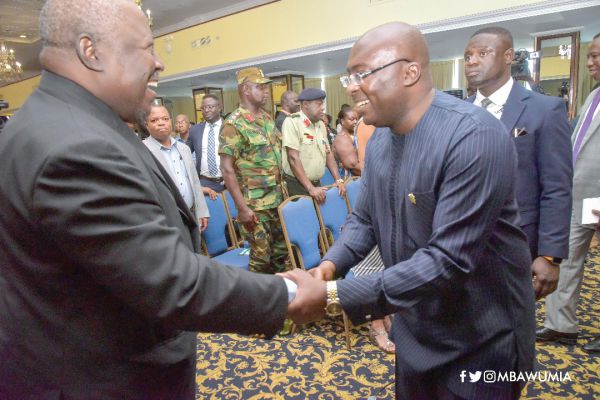
Time to confront corruption head on
The Vice-President, Dr Mahamudu Bawumia, has stated that the government has an unwavering commitment to fight corruption.
He said backed by a strong political will, the government hoped to battle corruption systematically, deliberately and strategically
“It is time we confronted corruption head on; it is time we took difficult but necessary decisions and steps to minimise corruption in our national life,” he said.
Speaking during the climax of the three-day anti-corruption week celebration and conference in Accra yesterday, the Vice-President said:
“It is in our best interest as a nation to strive to use our human and financial resources in a more ethical and efficient manner to attract more investments and grow more rapidly to meet the expectations of the people.”
The event also marked the 70th anniversary of the Universal Declaration of Human Rights and the 15th anniversary of the United Nations Convention Against Corruption.
Dr Bawumia said corruption undermined the country’s ability to fulfil its obligation to promote, protect and respect human rights.
“The right to food, water, shelter, education and health and the ability to seek justice could easily be violated if a bribe is required to gain access to these basic rights,” he pointed out.
He, therefore, stressed the need to have systems in place to help fight corruption, since the informal systems which had existed since independence only bred corruption.
Dr Bawumia mentioned the systems as the paperless clearing of goods at the ports, online acquisition of driving licence and passports, the e-justice programme, among others, all of which had now been modernised under the government’s digitisation programme.
NACAP
The Vice-President also used the occasion to launch a digital version of the National Anti Corruption Plan (NACAP) known as the National Anti Corruption Action (online reporting dashboard) which had been developed to combat corruption and observed that progress of implementation of the NACAP, which was adopted by the country in 2014, had been slow and unimpressive.
Out of the 397 implementing partners targeted in 2017, he said, only 87 institutions reported on the implementation of the NACAP, while 11 out of 15 metropolitan, municipal and district assemblies (MMDAs) participated in the process.
Dr Bawumia encouraged all public sector institutions to take the necessary steps to implement their roles under the NACAP, saying the country’s vision of a Ghana beyond aid would be endangered if corruption was not effectively addressed.
SDGs
On the Sustainable Development Goals (SDGs), the Vice-President said there was an emerging view that “we cannot achieve the SDGs by 2030 if we are unable to promote and protect human rights in Ghana, and for sure there is no way we can promote and protect human rights when corruption is so pervasive and systemic in our everyday lives”.
To that end, he reiterated the fact that if Ghana could play an important role in the attainment of the SDGs, a lot would depend on how it tackled corruption.
“Corruption has contributed to our poor schools and hospitals, the high cost of living, indiscipline and deliberate delays in public service delivery.
It inflates project cost and undermines the efficacy of our budget, thereby undermining the principle of fair and equal treatment,” he said.
Right to information
On the right to information bill, a Deputy CHRAJ Commissioner, Mr Richard Quayson, urged the government and Parliament to do everything necessary to meet the aspirations of the citizens regarding the bill.
He said between 1993 and 2018, the commission received 254,925 complaints, which meant an average of 10,197 complaints annually, while 251,658 out of the total number of complaints had been resolved, averaging 10,066 complaints resolved every year.
He lauded the implementation of the free senior high school policy, which he said was to ensure access to education for all, and urged the government to take urgent steps to address the challenges associated with the policy in a timely manner to ensure that no student was left behind.
The First Deputy Speaker of Parliament, Mr Joe Osei-Owusu, who chaired the event, called for attitudinal change and stressed the need for proper values to be instilled in the next generation to rid society of the canker of indiscipline.
He said Parliament was doing a lot to pass the right to information law and so the picture must not be painted as if nothing was being done.